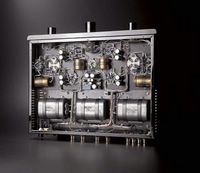Xindak, Audreal and Melody
Source: French hifi-magazines
Audreal brand arises from cooperation between Chinese Xindak Electronic and its French distributor, Delta Sigma. Based on various Xindak products, distributor has suggested a numerous improvements to tune the sound. Xindak XA6800 was reviewed by Revue de Son in November 2004 (reviewer Jean Hiraga: "astonishing permormance/price ratio", "c'est une affaire en or"). This 1.100 Euros integrated has 80wpc, operates Class-A up to 30wpc, MOSFET output stage, and is fabulously built for the price. The Audreal Duo 2.0 was reviewed by Haute Fidelite May 2005. Externally Duo 2.0 seems to be almost identical with Xindak 6800, however internal pictures illustrate that serious modifications are indeed performed, like usage of Dale resistors and audiophile grade internal cabling. Price has risen to 1.500 Euros. Verdict: drives demanding load (speakers were Thiel CS2.4), authoritative, yet musical sound, airy and well presented soundstage. 5/5 stars for quality/price.
Audreal Duo 1.0 was reviewd by Revue de Son in March 2005. The retail price of this integrated amp is 990 Euros, specs include 80wpc, both SE and balanced inputs, and like with Duo 2.0 good quality condensators, Dale resistors, and internal cabling. And unfortunalety, just like with Duo 2.0, motorised ALPS volume potentiometer (for the record, I hate ALPS potentiometers due to their low quality!). Jean Hiraga & Robert Lacrampe: "Goes beyond Xindak XA6800 in sonical terms", "exceptional quality/price ratio".
How intriguing Xindak or Audreal might look, for me the real deal are Melody amplifiers. Design work is done by serious Australian audiophiles, and production in China. What allures me is the seriousness of components used in all Melody models: all the internal parts are audio-grade quality, matched to close tolerances.
Pre-amp SHW1688II (see picture below) uses rare 101D (and 6SL7s, 6SN7s) tubes, Aerovox oil-filled and Jensen silver foil capacitors, Riken and Dale resistors, stepped audio attenuator etc. Power amp SHB300B uses also Jensen silver foil capacitors in conjuction with Howland Musicaps. Even the entry model, SP3 integrated, uses stepped audio attenuator, paper-in-oil caps (Melody claims these to be NOS!). Clearly, not much room for DIY modifications. The build quality throughout the range is equally impeccable.

In October 2004 issue of Revue de Son Jean Hiraga and Robert Lacrampe went literally ballistic in commenting SHW1688II pre-amp. JH placed it among 2-3 best pre-amp he has heard, but RL went ever further "... se place au sommet de ma hierarchie personnel", i.e. pretty much the best pre-amp he has heard. In Haute Fidelite January 2005 Antoine Gresland gave equally high appraisal: "SHW1688 is phenomenom in its category", and he was almost equally impressed by accompanied SHB300B power amps.
French hifi-press has given equally positive reviews for integrated SP3 (Prestige Audio Video No.104, Revue de Son January 2005), and for EL34 based integrated H34II (Prestige Audio Video October 2004).
Viewpoint: It's a shame that French hifi-magazines are not more accessible for foreigners (i.e. you have to read French). I have to confess that occasionally I sense that French products tend to be too favourable reviewed, but same can be witnessed with the British magazines. French hifi-tradition in general and especially their sometines esoteric approach complements nicely Anglo-Saxon and German hifi traditions.
As for Melody, either we are dealing with French consipiration or alternatively these product indeed present outstanding price/performance ratio. My only concern (and which prevented me from buying it) with Melody SHB1688 pre-amp is lack of adjustable gain. The 26db gain limits its usage with high-gain power-amps.
BTW, in June/August 2004 issue of Revue de Son Jean Hiraga and Jeau-Pierre Landragin reviewed Mark Levinson 320S pre-amp. For JH it was "a new grand reference" and they concluded by stating "Astounding sonic performance". Lets see when these gentlemen manage to review Audio Research's latest Reference 3 pre-amp.



<< Home